Introduction
Dependent elderly are:
- People who need assistance in daily activities and protection.
- Sick adults who are hospitalized all the time.
- They may include the mentally ill (Payne, 2005).
Dependent elderly are people who need assistance to do daily activities and to protect themselves. They also include sick adults who are in hospitals all the time. Dependent elderly people may also include the mentally ill.
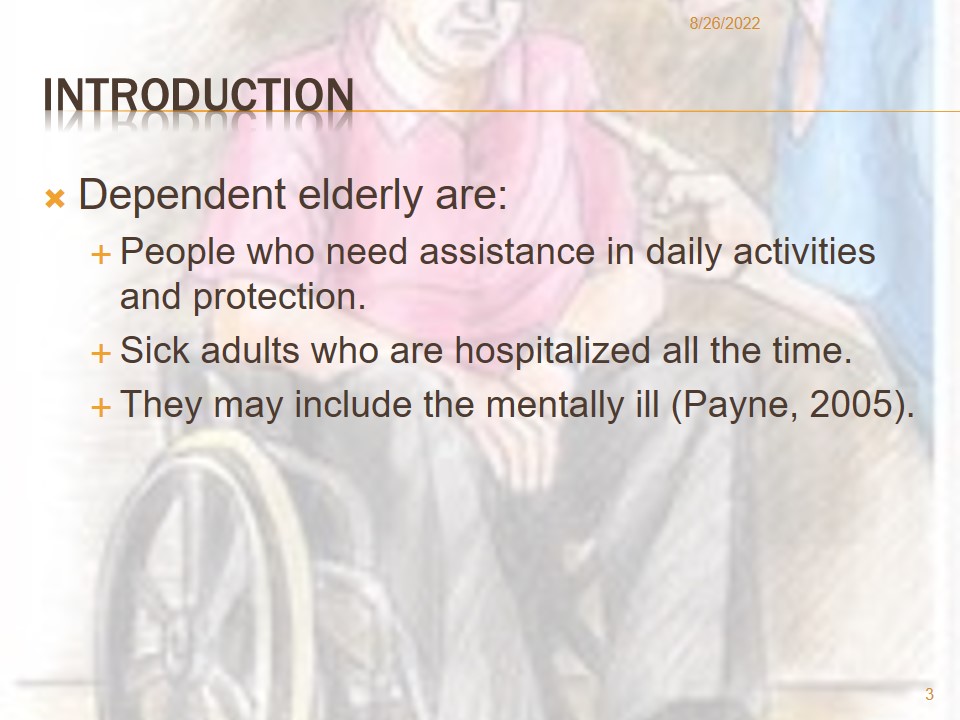
Understanding elderly abuse
- Elderly individuals are neglected or abused altogether.
- Relatives to the elderly are the main abusers.
- Homes have been set up to take care of senior citizens.
- Legal action can be taken against perpetrators of elderly abuse.
- The elderly are encouraged to report abuse (Bonnie & Wallace, 2003).
Several homes have been created in an effort to take care of these senior citizens. There are individuals who neglect or abuse dependent elderly altogether. It is also very common to find that most of the people who abuse the elderly are their relatives. There are legal actions that can be taken against perpetrators of elderly abuse. The elderly are always encouraged to report an abuse from anyone.
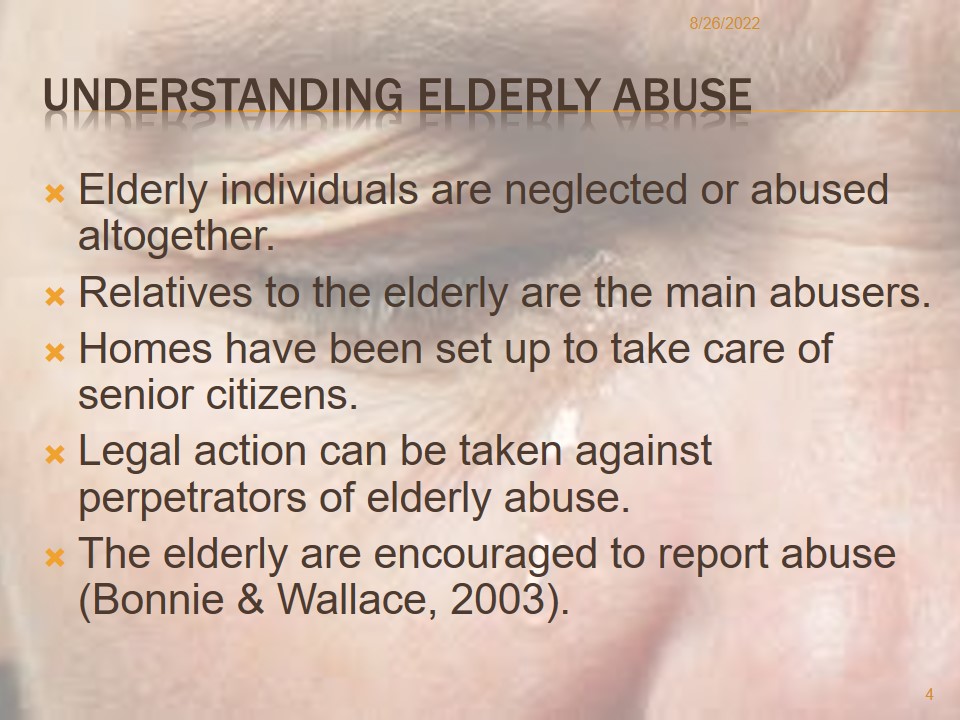
Forms of dependent adult and elderly neglect
- Physical abuse:
- beating.
- sexual abuse.
- any other physical harm.
- Financial abuse:
- stealing the identity of the elderly.
- forging their signatures.
- taking the elderly to the streets to beg (Summers & Hoffman, 2006).
- Emotional abuse:
- verbal and non verbal abuse.
- Verbal abuse:
- yelling
- ridicule
- Laughing and blaming
- Non verbal:
- ignoring the elderly
- Jeering them
- Deprivation:
- denying them food, water, and bath among other important things.
- Isolation:
- locking the elderly in the house all the time.
- hiding them from the rest of the family.
- Harmful treatment:
- wrong medical treatment.
- making the elderly work, despite their frail condition (Summers & Hoffman 2006).
Physical abuse entails beating, sexual abuse and any physical harm that may be done to the elderly (Payne, 2005).There are state laws that punish offenders who physically abuse the elderly. Different states and countries have different laws that deal with such criminals. However, some of the common legal punishments include jail time, payment of fines or community service. Financial abuse is the taking advantage of the elderly in financial matters (Roubicek, 2009). Other acts that entail financial exploitation include forging of their signature, taking the elderly to the streets to borrow money, stealing their identity, and manipulating the elderly into paying for gifts.
Emotional abuse entails the use of hurtful words toward the elderly (Summers & Hoffman, 2006). This abuse can be categorized into two: verbal and non verbal abuse. Verbal abuse includes yelling at the elderly, ridiculing them, laughing at them, and blaming them in order to get out of trouble. Non verbal abuse includes ignoring and jeering the elderly. This might make the elderly very sad and lonely. such bad attitudes might also make them sickly due to their fragile health.
Deprivation can be terms of refusing to give them necessary things. These include food, water, baths and even the medicines that the elderly need. Deprivation of other things like socializing and talking to other people are also considered as elderly abuse. Isolation is separating the elderly from other people. It can be done by locking them in the house all the time or hiding them somewhere far from the rest of the family. There are cases when the caregiver might isolate the elderly due to illness. If this is the case, it should be carefully investigated and the elderly should not remain in isolation for a long time (Meis, 2011). Harmful treatment involves giving the elderly wrong medications in order to control them. It also involves making them work, despite their frail condition.
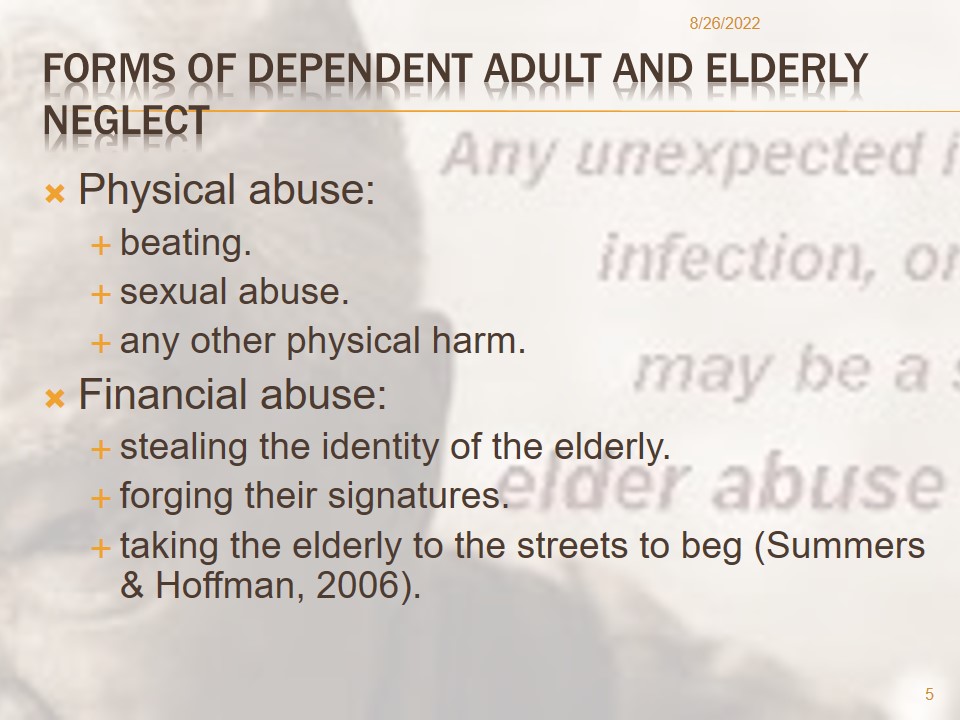
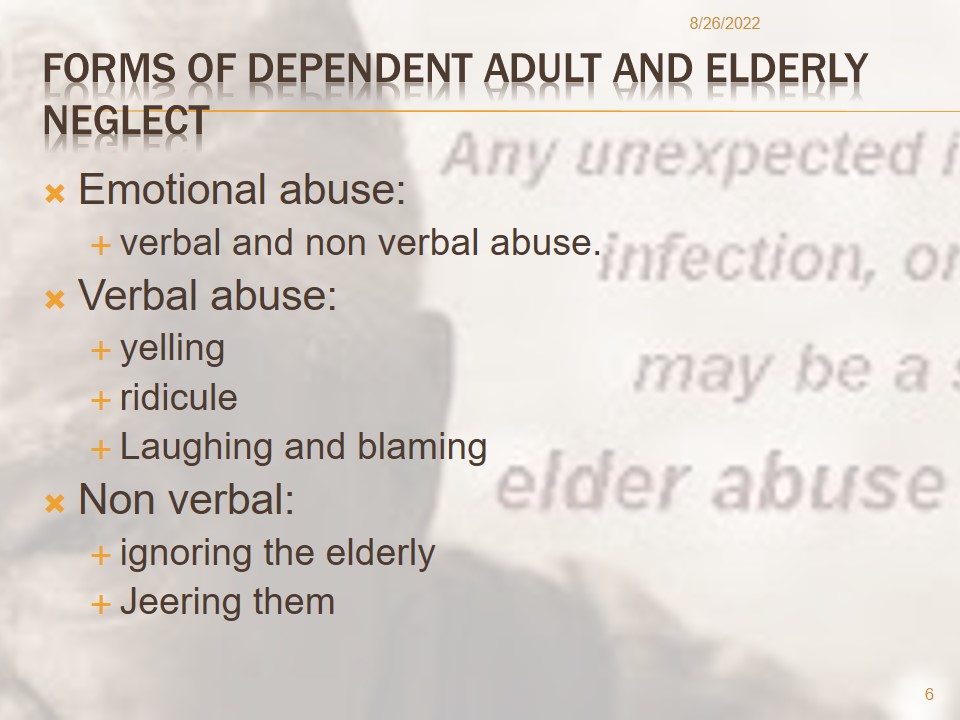
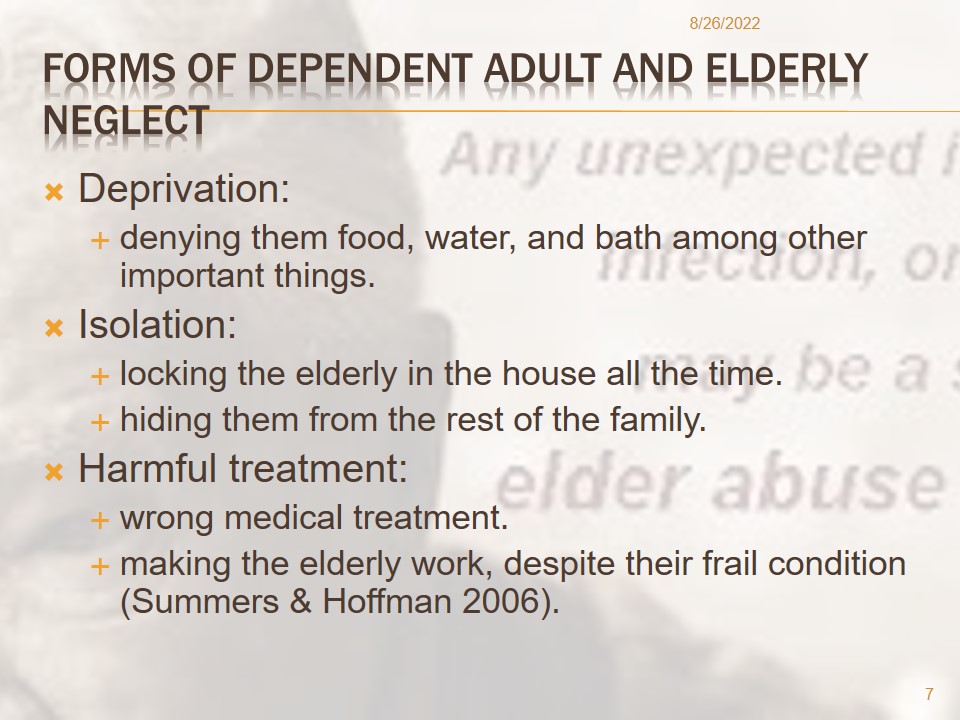
Warning signs of dependent adult and elderly abuse
- Multiple injuries:
- they may include bruises, black eyes and open wounds.
- broken ribs and fractured bones can be seen in a medical setting (Roubicek, 2008).
- Injuries are a sign of physical abuse.
- Poor health:
- it includes sudden drop in body weight.
- malnutrition.
- This is an indicator of:
- neglect.
- deprivation of clean living conditions.
- lack of basic necessities like shelter and clothing.
- Sadness or withdrawal (Meis, 2011).
- Bank withdrawals that the elderly cannot explain:
- a sign of financial abuse
- Sexual abuse can be identified in a medical setting.
- Complaints from the individual:
- these should not be viewed as delusional (Payne, 2005).
Multiple injuries on the body of the elderly individual can denote physical abuse. These injuries are usually very visible since the skin of the elderly takes longer to heal. The fact that the elderly person is always wearing warm and big clothes might indicate that they are trying to hide the marks. If this is the case, one should slowly request them to show part of their body to confirm that they are not physically abused. In a non medical state, one can check for bruises, black eyes and open wounds. In a medical setting, one can check for broken ribs, and fractured bones among other things.
Poor health is one of the best signs to show neglect of the elderly. The elderly are usually sickly, but a sudden drop of body weight and signs of malnutrition might indicate that they are undergoing some form of abuse. Most of the time this shows deprivation of clean living conditions and also of the basic necessities like food, shelter and proper clothing. Even though most of the elderly people do not talk much, a difference in behavior can denote abuse or neglect. One should look out for withdrawal and a generally sad state. One should also note the time when the withdrawal starts and whether it is caused by the presence of a certain individual.
Bank withdrawals should raise an alarm that the specific elderly is being financially abused. There might be financial abuse if the elderly cannot explain the withdrawals or if they explain them hesitantly. In a medical setting, one will also be able to determine if the elderly person has experienced sexual abuse. There are various tests that will indicate abuse. If the test show that the elderly has been sexually abused, the nurse should not let the elderly leave until a police statement is made. Some of the elderly people complain that they are being abused. However, most people ignore them as they are thought to be delusional because of their age. If this is the case, one has to first investigate that the elderly is not harmed before they dismiss the complaints. All these efforts will help save the elderly and put such criminals behind bars.
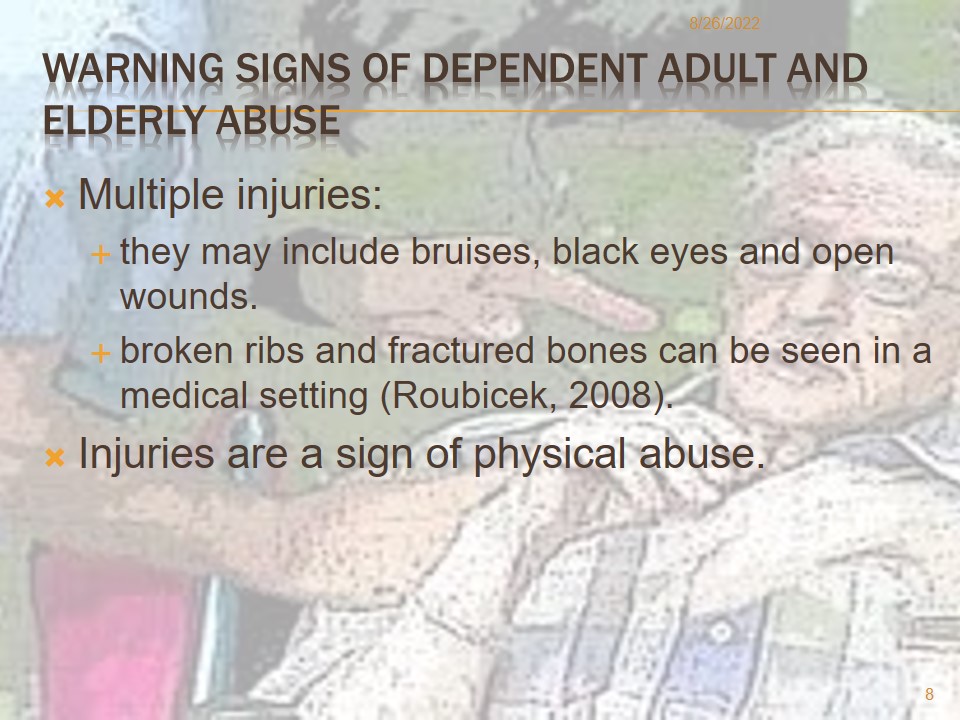
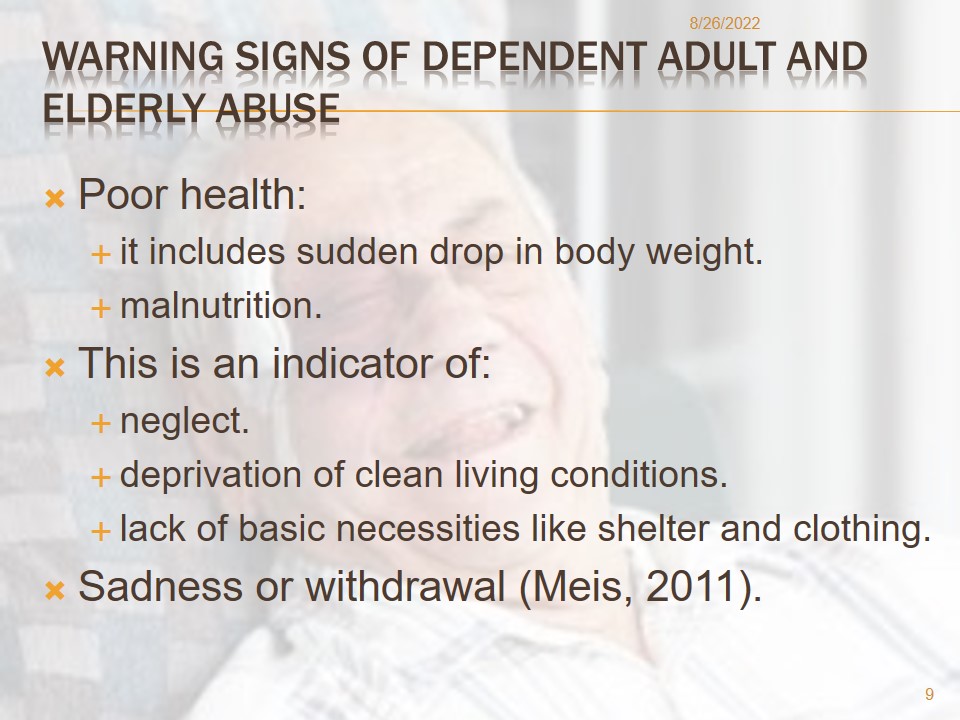
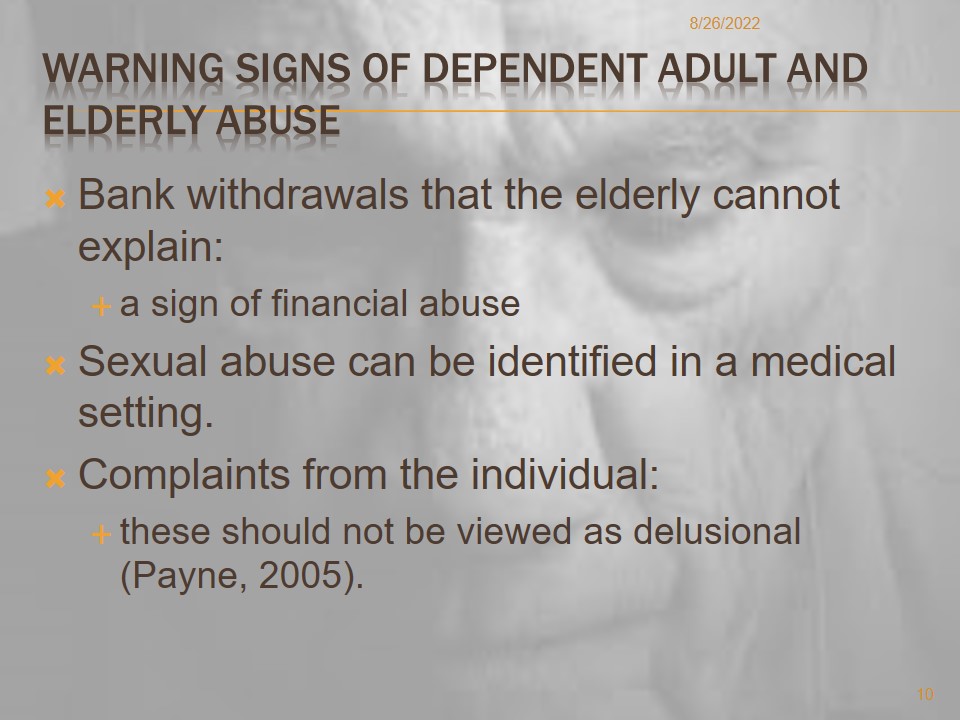
Legal/ethical considerations for reporting abuse and neglect
- Mental and physical illnesses may develop:
- the caregiver may become mean to the elderly.
- the caregiver may be revenging abuse that he/she suffered at a young age (Bonnie & Wallace, 2003).
- Financial problems:
- some caregivers can use the elderly’s money for their own good, leaving the elderly vulnerable.
- Decision making capacity.
- Paternalism:
- limiting the elderly’s freedom to keep them safe.
Illness –this is in the case where the caregiver is ill. This can be mental illness or physical illness. Mental illness can make the caregiver mean to the elderly. There are cases where the caregiver abuses the elderly since the elderly abused them when they were younger. All these are categorized as mental illness. There are caregivers who use the elderly’s money for their own good. They can invest the money or use it to buy medications when the elderly have no money. The elderly may be making decisions themselves or the caretaker makes the decisions for them. This should be determined before deciding whether the elderly is abused or not. Limiting of one’s freedom in order to keep them safe is called paternalism. This might appear as hiding or isolating the elderly to some, but there are times when the elderly is self abusive or generally in a habit of putting themselves into danger. The caregiver is not abusing the elderly in such a case, but protecting them.
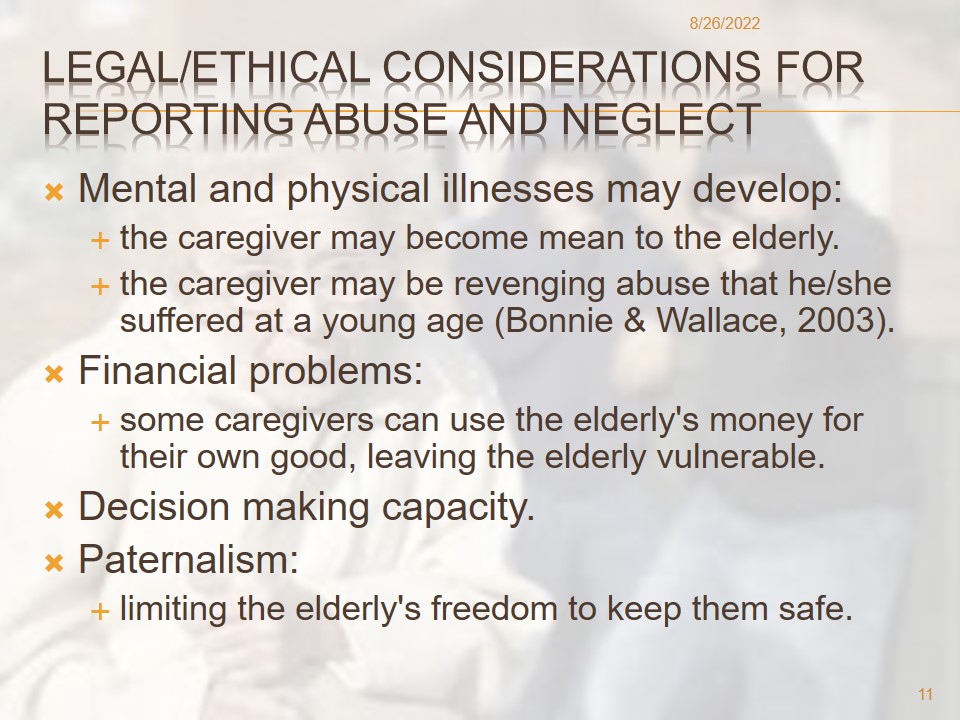
Conclusion
- Most elderly people experience abuse, but they hardly report.
- Elderly abuses range from financial, emotional, physical, to sexual abuse.
- Perpetrators of dependent elderly abuse should be punished.
- Some forms of treatment, such as paternalism, are not considered as elderly abuse.
There are different types of elderly abuses, including physical, emotional, sexual, and financial abuse among others. Perpetrators of elderly abuse should be punished. Both legal and social punishment of perpetrators vary from one place to another. There are times when one does not mean to abuse the elderly. When this is the case, some legal and ethical considerations are made. Some of the legal considerations include illness and some financial problems. Financial problems entail the caregiver having no other means of supporting the elderly, thus taking some of his/her money in order to provide basic needs. Some of the ethical considerations include decision making capacity and paternalism. Paternalism is limiting an individual’s freedom in order to protect them from harm.
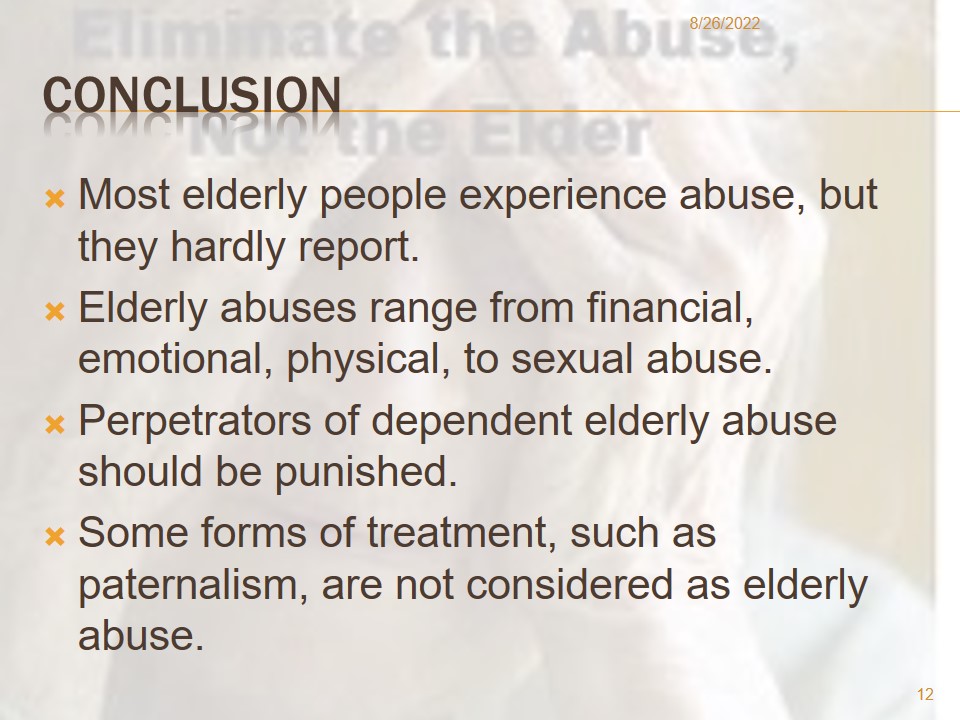
References
Bonnie, R. J., & Wallace R. B. (2003). Elder mistreatment: abuse, neglect, and exploitation in an aging America. Washington, D.C.: National Academic Press.
Meis, M. (2011). Geriatric orphans: a study of severe isolation in an elderly population. Saarbrücken: VDM Publishing.
Payne, B. K. (2005). Crime and elder abuse: an integrated perspective. Springfield, IL: Charles C Thomas Publisher.
Roubicek, J. (2008). Financial abuse of the elderly: a detective’s case files of exploitation crimes. New Delhi: Ruby House Publishers.
Summers, R. W., & Hoffman A. M. (2006). Elder abuse: A public health perspective. Washington, D.C.: American Public Health Association.